- Home
- Peter F. Hamilton
Judas Unchained cs-2 Page 23
Judas Unchained cs-2 Read online
Page 23
Then several hours into the invasion, MorningLightMountain encountered the SI. It was a fascinating interlude, actually hearing the great artificial intelligence talking directly to its foe. For a while Dudley felt something close to cheer as the SI promised MorningLightMountain it would never succeed. Somehow the SI was blocking a herd of motiles on Elan, which was where the encounter originated. Then MorningLightMountain issued a batch of generalized attack instructions to its soldier motiles in the vicinity and the interference ended.
After that, the Commonwealth worked out how vulnerable inter-Prime communications were, and used their electronic superiority to slow and harass the inexorable advance. In among all the chaos and violence, the frantic fight of the starships, the exotic battle above Wessex, there were several more glitches on Elan, so small-scale that MorningLightMountain’s main thought routines barely registered them. Dudley, however, was very interested indeed. The SI obviously had some obscure interest there, though he couldn’t think what.
It had taken weeks of cautious travel between various settlements in the Dyson Alpha system, but he’d eventually wound up in a ship at the giant interstellar staging post, which MorningLightMountain was busy repairing after the Desperado’s relativistic attack. From there he maneuvered his way to the wormhole that led to Randtown.
Despite having access to a colossal amount of data from arrays and systems it had captured in the Commonwealth, MorningLightMountain still didn’t really comprehend the motivations and behavior of humans. Randtown was one of the small enigmas it was now presented with. There was no strategic logic behind the town, it had no mineral resources, few agricultural lands, and no manufacturing capacity. To MorningLightMountain it was virtually useless. The only possible asset was the Trine’ba, which could be readily converted into a congregation lake. Its size was excessive, even for MorningLightMountain, but the waters were exceptionally clean. After consideration, the major thought routines decided that was the best way to utilize that section of the planet.
A gateway was constructed. Appropriate equipment was sent through. Buildings were assembled that could house immotiles, and motiles were brought together to begin amalgamation. It was just before MorningLightMountain connected the wormhole to a vast refinery back in its home system that bred base cells that it discovered the fanciful aquatic life that inhabited the deep, still waters.
Dudley discovered then that MorningLightMountain hated fish. Hate itself was a new concept for the unitary Prime. Something introduced by Dudley when that set of his memories were still incarcerated within the immotile unit, one of several new interpretations on life that MorningLightMountain could not expunge. A subtle alteration in the Prime’s way of thinking that didn’t quite reach the level of contamination, but a change nonetheless.
It had taken millennia, but all non-Prime animal and insect life had been wiped from the Prime home planet. Now MorningLightMountain was faced with the notion of tiny little animals nibbling at its own base cells, in a way devouring bits of itself, its own life. Such an assault was one of the reasons it had set out to establish itself as the only life in the galaxy. All life was in competition. That was why none could be tolerated.
Motiles were immediately dispatched to extract buried arrays and memory crystals from the ruins of Randtown, accessing them for data on the life that infested the waters of the Trine’ba. MorningLightMountain learned that the fish were actually quite delicate organisms, living in a precarious harmonious balance with their unique environment. The corals that they lived off were also susceptible to microchanges in their milieu.
The fusion drive ships had already devastated vast amounts of aquatic life in the lake, but that wasn’t enough. MorningLightMountain revised its estimate of how much base cell-saturated water it would need to pump into the massive lake to insure complete obliteration of native life. Enough base cells would darken the waters, devour the nutrients that the corals and fish thrived on, and probably infect the local creatures badly enough to kill them off. Ultimately, although it would lose base cells to the voracious fish, they in turn would die and release their body compounds into the lake for the base cells to feed off.
Dudley bent one of his sensor stalks to watch the dark liquid spurting out of the gateway. The sheer volume was impressive, and it would continue to gush through for months to come. But in terms of the scale that MorningLightMountain thought and operated on it was insignificant. The sensor stalk’s eye tracked around, following the liquid as it permeated the force field and gurgled away sluggishly into the lake. That was going to infuriate the surviving humans, Dudley knew.
Since the last batch of humans had somehow vanished inside the Turquino Valley on the day of the invasion, there had been small acts of sabotage against machinery and vehicles and ordinary motiles, mostly with weak industrial explosives. MorningLightMountain’s motile soldiers had never caught the humans who committed the attacks. Dudley reckoned they had to be locals to sneak about unseen in such a fashion. If so, they’d be committed conservationists.
His three other sensor stalks swung around like biological radars, sizing up the land. They’d try to shut down the gateway, stop the sacrilegious pollution. Looking at the layout of the town and surrounding countryside, he tried to work out how humans would attempt to infiltrate the force field. Dudley wanted to meet them.
***
Adam knew he was getting paranoid. The team back in Lemule’s Max Transit office was running electronic observation on him. Young Kieran McSobel sat on the chair opposite, casually vigilant and armed to the teeth. He never used to take such precautions, not for a simple train ride to another planet. But that was before the Guardians’ current run of bad luck. Besides, a little healthy paranoia never hurt.
The express from LA Galactic to Kyushu in phase one space took less than thirty minutes. They took a taxi to the Baraki Heavy Engineering works, which was on the other side of the extensive CST planetary station. Mr. Hoyto, the manager, greeted them in the firm’s elaborate marbled reception hall, and they were ushered up to his fifth-story office for the contract signing. The office didn’t have a view outside; instead the windows looked out into the long engineering shops, where train engines were surrounded by scaffolding and bots under yellow-tinged lighting. An impressive amount of work was being conducted, with some of the engines half dismantled, their components being replaced or serviced by specialist teams. Baraki didn’t manufacture engines themselves, but they held the CST maintenance contract for Kyushu, and were expanding their market for the smaller train operators. They were even licensed to handle the fission micropiles for atomic-powered engines.
“Yours,” Mr. Hoyto said, and gestured proudly.
A big Ables ND47 nuclear engine had just been rolled into a service bay. It was over thirty years old, a giant workhorse designed for hauling heavyweight wagons across continents. Adam had started up yet another LA Galactic company, Foster Transport, to operate the aging colossus, supposedly to collect ore from a dozen stage two worlds and deliver it to the smelting refineries on Bidar. Baraki had won the refurbishment and stage one maintenance contract from Foster; they’d even arranged a good credit line to help the fledgling company finance their first train.
Adam and Kieran acted surprised when Mr. Hoyto’s secretary brought in a bottle of champagne. The cork was popped as Adam authorized the contract, and transferred Foster Transport’s first payment into Baraki’s account. They all drank a toast to the future of ore shipping.
Baraki was going to give the Ables ND47 a complete overhaul, which was scheduled to take no more than a month, Mr. Hoyto promised. After that, it would be rolled down into the paint chamber at the other end of the facility, and emerge shining in Foster Transport’s blue and gold colors, as good as new. The company’s nuclear division had already inspected the micropile, and agreed that it had at least another seven years’ useful life left.
Adam smiled grimly at that. Not only a train owner now, using CST’s tracks, but he’d also bo
ught himself a fission reactor. His other pet hate. Fission should have been abandoned back in the twenty-first century when fusion stations finally came on-line. But, oh no, the capitalist market wanted cheaper energy, no matter the cost in radioactive waste.
He and Kieran took up Mr. Hoyto’s invitation to inspect their new purchase before the bots and engineers began the refurbishment project. They walked out into the harsh yellow glare of the hot lights, blinking against the welding flares and smelling the oil being drained from hundreds of mechanical systems.
Kieran put on his hard hat. “Is this safe?” he asked. “It’s very similar to what we did with the Alamo Avengers.”
“It’s nothing like the same,” Adam countered. He stood at the base of the ND47’s forward coolant intake grille, and looked up. The front of the vehicle was as tall as a two-story house, and equally blunt; its original chrome finish was now almost invisible beneath a scabby coat of rust flakes. “They were weapons systems. We took a risk refurbishing them to operational standard, and navy intelligence will no doubt be keeping a watch for any similar scenario. But this is a straightforward commercial project.”
“All right then,” Kieran said. “I’m making good progress on acquiring the kind of standard defense systems we’ll equip it with. Buying armaments these days is a lot easier. Everyone wants some personal protection from the next Prime attack.”
“I know, that’s why the cost of military hardware has gone through the roof, bloody profiteering companies.”
Kieran slapped one of the engine’s massive steel wheels. “I’m not even sure we need a force field on this. A tactical nuke would probably only slow it down a little.”
“Don’t you believe it. One shot in the right place and we come to a very sudden and badly radioactive halt. We have to protect the track ahead of us; that means a decent amount of firepower. That’s all got to be installed and tested before we can even think about running the Boongate wormhole.”
“I thought I’d get the wagon conversion done on Wuyam. There’s a couple of promising supply companies I’ve contacted, and it has a bunch of empty warehouses around the CST station we can use for assembly. I’m looking into hiring one.”
“Good enough.” Adam started to walk down the length of the ND47. The bodywork with its old E&W paintwork was bleached to a pale sulphur and plum-purple; various exhaust vents were picked out by vertical sprays of black soot engrained into the pitted composite surface. Halfway down, the micropile access hatch looked like the kind of circular door a bank vault would employ.
“Do you think we’ll be ready in time?”
“What time is that?” Adam was surprised by the note of uncertainty in the younger man’s voice. The Guardians Johansson normally supplied were full of a disturbing confidence.
Kieran smiled nervously. “Who knows. Dreaming heavens, if the Primes attack again tomorrow we’ll be screwed.”
“So we work on the assumption that we’ll be ready before they do attack. There’s nothing else we can do. A lot of the planet’s revenge components are ready to be crated up.”
“Apart from the data Kazimir was carrying,” Kieran said bitterly.
“Well now, we might have a new angle on that. Someone has been in touch with me who has a possible connection to Paula Myo. She might be able to find out where the data is.”
“Who?”
“Someone who isn’t a Guardian, yet believes in the Starflyer, or says she does. She has a very plausible story.”
“Really?”
“Either that or the Starflyer is closer to us than I want to consider. Normally I have a lot of trouble believing anything that useful gets handed to me on a plate.”
“Beware of Greeks bearing gifts.”
“Precisely.”
“So you don’t trust her.”
“No. Not yet, anyway. Of course, she is cautious about us, as well. Which I have to respect. I’m going to have to work out some seriously foolproof method of establishing if she’s a bona fide ally. Having a new friend, even this late in the game, would be very helpful.”
“How are you going to prove she’s on our side?”
“Delivering Kazimir’s missing data to us would be a big plus in her favor. Apart from that, I haven’t got a clue.”
***
With the casework on the Lambeth Interplanetary Association finally slowing up, Renne managed to haul out the files on the Trisha Marina Halgarth shotgun investigation for a review. Forensics had sent their results to the Paris office over a week ago. Vic Russell had scanned them, and attached a summary. Nothing unexpected or unusual had turned up, which maintained the case’s low-priority coding. They’d been sitting in Renne’s e-butler hold store ever since.
She went through the perfectly laid out tables and holographic graphs and columns of text. Vic was right, everything was as it should be. The data analyst had confirmed that Howard Liang’s background details were all proficient forgeries. Biomedical forensics had found some samples of skin and hair in his apartment, and analyzed the DNA, which they confirmed came from a McSobel. His finances were tracked to a single cash deposit of fifty thousand Earth dollars in a Velaines bank.
“Damnit,” she muttered at the desktop portals. All the exemplary, predictable details were a direct follow-on from the perfect crime scene.
Am I really this paranoid?
She gave the data another read-through, but there was nothing she could find fault with. The Guardians had done it. It was a conclusion anybody would come to. So why can’t I believe that?
Thinking back, it wasn’t the crime scene, the victims, nor even the Guardians’ method of operation. She could accept that those would all be the same or similar to the other shotgun setups she’d witnessed before. What bothered her was the responses the girls had made. They’d been upset, angry, and, in Trisha’s case, burdened by guilt, everything the investigating authorities would expect; but none of them had been surprised. Trisha had never asked: Why me?
The forensic data remained in her portals, a glowing script awaiting allocation and certification. Logically, it should be classified under ongoing low priority, keeping the information available for immediate cross-referencing to all other Guardian cases. There were no leads to follow, no way to pursue the individual perpetrators of the crime. Realistically, the only way an arrest would ever happen was if navy intelligence rounded up the whole Guardian organization.
Laughter drifted over the office. Renne didn’t have to look up to know who it came from: Tarlo’s immediate team. She knew they were making good progress on tracking Kazimir McFoster’s finances. Morale was high over in that nest of desks; they produced results. Commander Hogan was supportive and encouraging.
She wasn’t that bothered, careerwise; right now the threat that the Commonwealth was facing meant she should put such personal considerations firmly to one side. Work in a team for the greater good.
Ah, bollocks to that.
Renne asked her e-butler to access the current files on all three of the girls. They came up right away on her screens. Trisha Halgarth had gone back to Solidade, which wasn’t surprising. Catriona Saleeb was still in the apartment, which she was now sharing with two others. Isabella had moved out of the apartment, but hadn’t told navy intelligence where she’d gone as she was required to do. That wouldn’t be so unusual, but at the same time she’d put a block on her unisphere address code, and remained out of contact ever since.
Renne felt a small grin spread over her face. Finally, an abnormality. “Get me Christabel Agatha Halgarth,” she told her e-butler.
Alic Hogan was studying the information flowing over several desktop display screens when Renne knocked on the door. He just beckoned and indicated a seat in front of his desk.
“There really is nothing weird on Mars, is there?” he said in a distracted voice.
“ ‘Fraid not, Chief. We’ve had experts go through the whole data profile. If there’s any hidden encryption in there, it’s beyond the best we�
�ve got to find it.”
“Damnit, I hate leaving files like that open-ended.” He shook his head, and looked up from the screens. “What can I do for you?”
“I’d like a warrant issued for Isabella Halgarth.”
“Who’s she, and why?”
“She was one of Trisha Halgarth’s apartment mates. She seems to have vanished.”
Alic Hogan sat back in his chair, looking unhappy. “All right, what’s going on?”
“I’ve just reviewed the forensic data we got back from the shotgun case, the one where the Guardians claimed our President was an alien agent.”
Alic managed a slight smile. “Oh, yeah, I remember that one. The President’s aides were knocking down the Admiral’s door inside thirty seconds of that one hitting the unisphere. So what’s the problem?”
“No direct problem. I was concerned about our total lack of progress on the whole shotgun issue.”
“Okay, commendable enough,” Alic said, with only mild suspicion. “Although I’m not sure about your priorities here.”
“Any approach which can get us into the Guardians is viable as far as I’m concerned.”
He held his hands up in defeat. “Good point. Go on.”
“I wanted to reinterview the shotgun victims, see if there was anything they remembered now that they didn’t directly after the event. A lot of crime victims do, after the initial shock and confusion has been overcome, and they have time to think about what happened.”

 A Night Without Stars
A Night Without Stars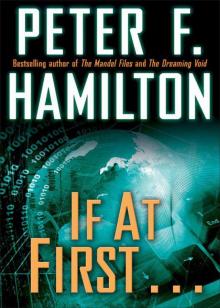 If at First . . .
If at First . . .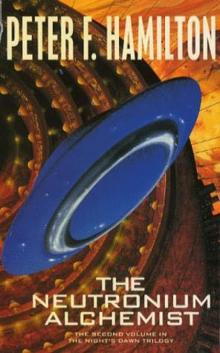 The Neutronium Alchemist
The Neutronium Alchemist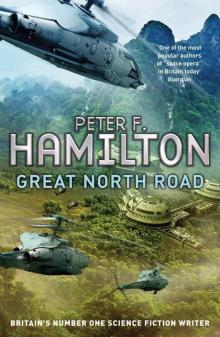 Great North Road
Great North Road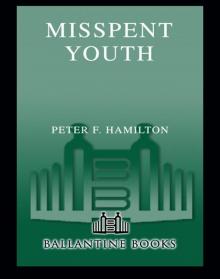 Misspent Youth
Misspent Youth Pandora's Star
Pandora's Star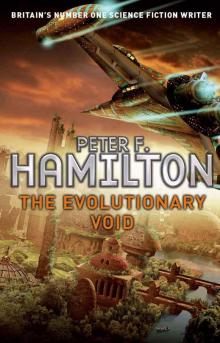 The Evolutionary Void
The Evolutionary Void The Dreaming Void
The Dreaming Void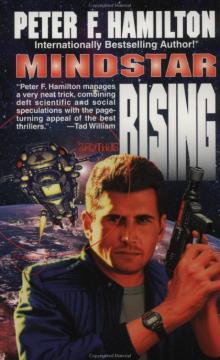 Mindstar Rising
Mindstar Rising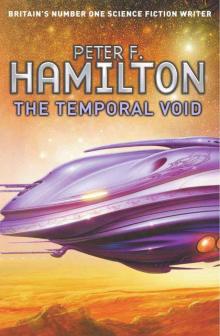 The Temporal Void
The Temporal Void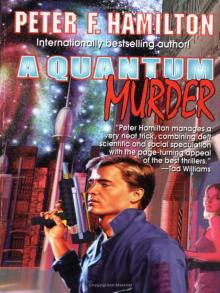 A Quantum Murder
A Quantum Murder The Hunting of the Princes
The Hunting of the Princes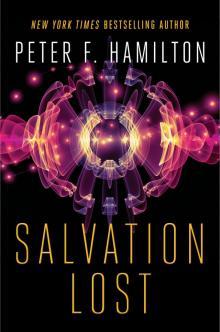 Salvation Lost
Salvation Lost The Dreaming
The Dreaming Salvation
Salvation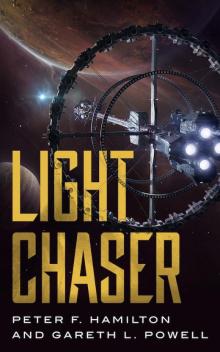 Light Chaser
Light Chaser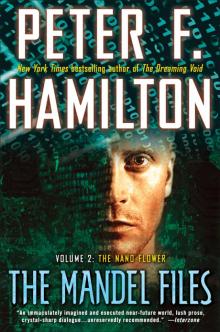 The Mandel Files, Volume 2: The Nano Flower
The Mandel Files, Volume 2: The Nano Flower![The Saints of Salvation [British Ed.] Read online](http://i1.bookreadfree.com/22/the_saints_of_salvation_british_ed__preview.jpg) The Saints of Salvation [British Ed.]
The Saints of Salvation [British Ed.]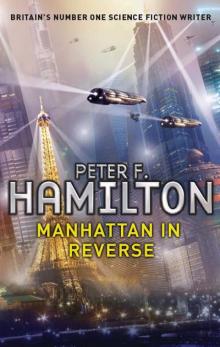 Manhattan in Reverse
Manhattan in Reverse The Secret Throne
The Secret Throne A Window Into Time
A Window Into Time A Second Chance at Eden
A Second Chance at Eden The Nano Flower
The Nano Flower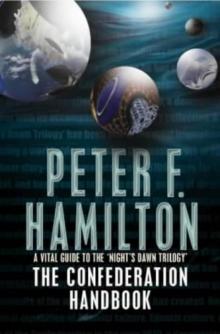 The Confederation Handbook
The Confederation Handbook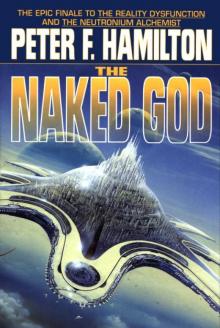 The Naked God
The Naked God The Saints of Salvation
The Saints of Salvation The Void Trilogy 3-Book Bundle
The Void Trilogy 3-Book Bundle The Abyss Beyond Dreams
The Abyss Beyond Dreams A Voyage Through Air
A Voyage Through Air Judas Unchained
Judas Unchained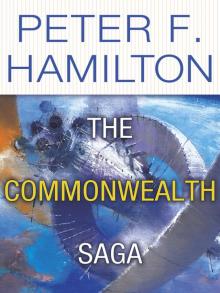 The Commonwealth Saga 2-Book Bundle
The Commonwealth Saga 2-Book Bundle The Naked God - Flight nd-5
The Naked God - Flight nd-5 Night Without Stars (Chronicle of the Fallers Book 2)
Night Without Stars (Chronicle of the Fallers Book 2)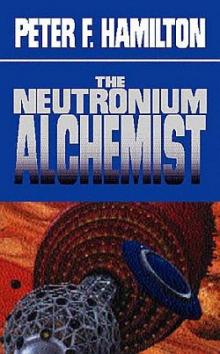 Neutronium Alchemist - Conflict nd-4
Neutronium Alchemist - Conflict nd-4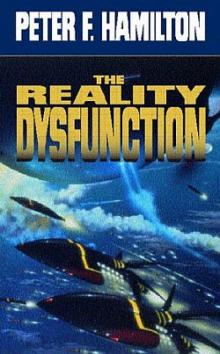 Reality Dysfunction - Expansion nd-2
Reality Dysfunction - Expansion nd-2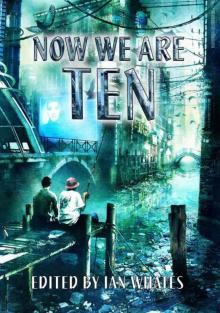 Now We Are Ten: Celebrating the First Ten Years of NewCon Press
Now We Are Ten: Celebrating the First Ten Years of NewCon Press Neutronium Alchemist - Consolidation nd-3
Neutronium Alchemist - Consolidation nd-3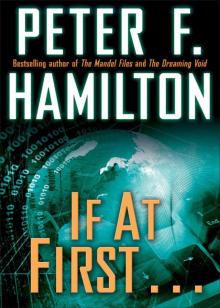 If at First . . . (Short Story)
If at First . . . (Short Story) A Second Chance at Eden nd-7
A Second Chance at Eden nd-7 Judas Unchained cs-2
Judas Unchained cs-2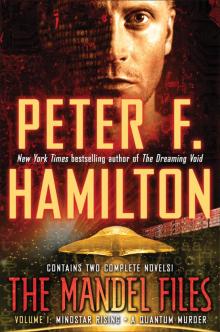 The Mandel Files, Volume 1
The Mandel Files, Volume 1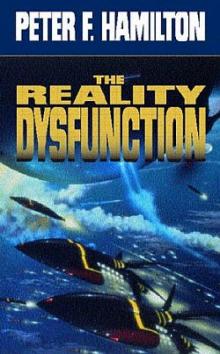 Reality Dysfunction — Emergence nd-1
Reality Dysfunction — Emergence nd-1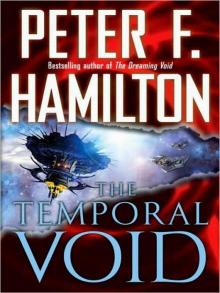 The Temporal Void (ARC)
The Temporal Void (ARC) The Mandel Files
The Mandel Files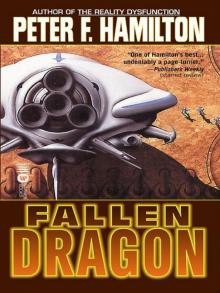 Fallen Fragon
Fallen Fragon Misspent Youth (commonwealth saga)
Misspent Youth (commonwealth saga)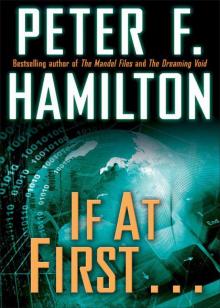 If at First...
If at First... Best of British Science Fiction 2016
Best of British Science Fiction 2016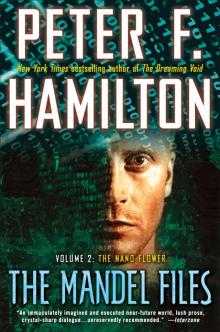 The Mandel Files, Volume 2
The Mandel Files, Volume 2 The Naked God - Faith nd-6
The Naked God - Faith nd-6 The Night's Dawn Trilogy
The Night's Dawn Trilogy Pandora's Star cs-2
Pandora's Star cs-2 A Window into Time (Novella)
A Window into Time (Novella)